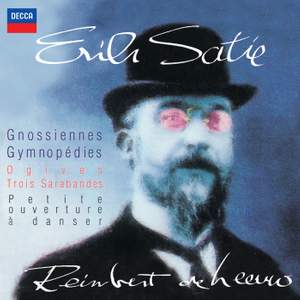Special offer. Satie: Six Gnossiennes, Trois Gymnopédies & Trois Sarabandes
Reinbert de Leeuw (piano)
Tender, solemn, droll, silly and occasionally plain boring, Satie's piano music has certainly proved its appeal for performers and record collectors, judging from the number of recitals devoted... — More…
Contents
Satie: Six Gnossiennes
Work length21:14
$5.10
$6.90
- Reinbert de Leeuw (piano)
- Recorded: 1992-09
No. 1, Lent
Track length5:37
$0.85
$1.15
No. 2, Avec étonnement
Track length2:58
$0.85
$1.15
No. 3, Lent
Track length4:05
$0.85
$1.15
No. 4, Lent
Track length2:51
$0.85
$1.15
No. 5, Modéré
Track length3:03
$0.85
$1.15
No. 6, Avec conviction et avec une tristesse rigoureuse
Track length2:40
$0.85
$1.15
Satie: Ogives (4)
Work length12:40
$3.40
$4.60
- Reinbert de Leeuw (piano)
- Recorded: 1992-09
1.
Track length2:30
$0.85
$1.15
2.
Track length4:01
$0.85
$1.15
3.
Track length2:28
$0.85
$1.15
4.
Track length3:41
$0.85
$1.15
Satie: Petite Ouverture à danser
Work length2:17
$0.85
$1.15
- Reinbert de Leeuw (piano)
- Recorded: 1992-09
Satie: Trois Sarabandes
Work length17:15
$2.55
$3.45
- Reinbert de Leeuw (piano)
- Recorded: 1992-09
No. 1
Track length6:35
$0.85
$1.15
No. 2
Track length5:45
$0.85
$1.15
No. 3
Track length4:55
$0.85
$1.15
Satie: Trois Gymnopédies
Work length13:23
$2.80
$3.80
- Reinbert de Leeuw (piano)
- Recorded: 1992-09
- Recording Venue: De Vereeniging, Nijmegen
No. 1. Lent et douloureux
Track length5:02
$1.10
$1.50
No. 2, Lent et triste
Track length4:10
$0.85
$1.15
No. 3, Lent et grave
Track length4:11
$0.85
$1.15





